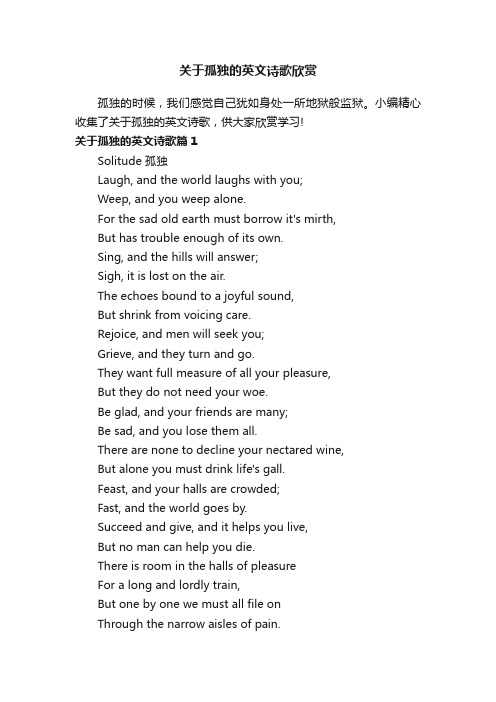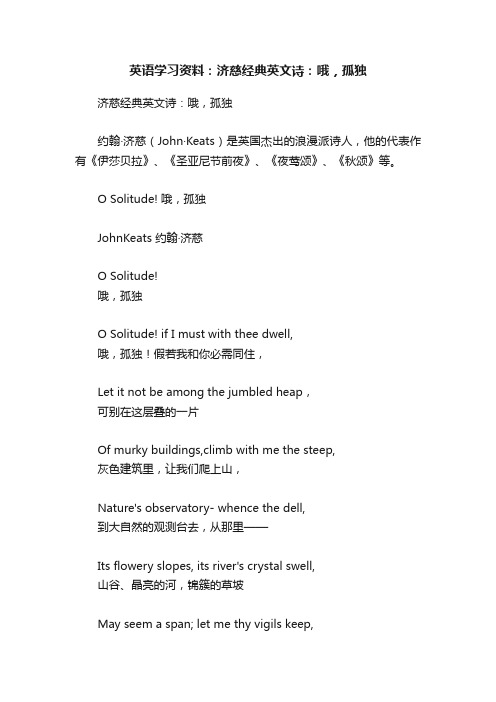英语诗歌阅读:孤独
古英语诗歌 wanderer

古英语诗歌 wanderer
古英语诗歌《Wanderer》是一首十分著名的古老诗歌,它被认
为是英国文学史上最重要的作品之一。
这首诗歌大约写于公元10世纪,它以第一人称的方式描绘了一个流浪者的孤独和内心的痛苦。
诗歌中的主题围绕着丧失、孤独和生命的无常展开,同时也探讨了
人生的意义和价值。
《Wanderer》描绘了一个流浪者在世界上流离失所、孤独无助
的形象。
诗中通过描述流浪者在海上漂泊、在寒冷的天气里徒步行
走的景象,表现了他的孤独和无助。
诗歌中还包含了对丧失和死亡
的深刻思考,以及对过去时光的怀念和对未来的迷茫。
通过这些描写,《Wanderer》展现了人类对于生命中无法摆脱的痛苦和挣扎的
思考。
诗歌的语言使用古老的英语,这使得它的阅读和理解对于现代
读者来说可能有一定的困难。
然而,正是这种古老的语言和充满哲
理的内容,使得《Wanderer》成为了古英语文学中的经典之作。
它
的价值不仅在于其文学性,更在于它对人类心灵和生命的深刻触及。
总的来说,《Wanderer》是一首关于孤独、丧失和对生命意义
的思考的古英语诗歌。
它通过描绘流浪者的形象,表达了对人类存在的深刻思考,成为了古英语文学中不可或缺的经典之作。
初二英语诗歌欣赏阅读理解20题

初二英语诗歌欣赏阅读理解20题1<背景文章>"Sonnet 18" by William Shakespeare"Shall I compare thee to a summer's day?Thou art more lovely and more temperate:And summer's lease hath all too short a date;And often is his gold complexion dimm'd;By chance or nature's changing course untrimm'd;But thy eternal summer shall not fadeNor lose possession of that fair thou ow'st;When in eternal lines to time thou grow'st:So long shall this, thy eternal summer, last."This sonnet is one of Shakespeare's most famous works. The theme of this poem is the beauty of the beloved. Shakespeare compares the beauty of his beloved to a summer's day. However, he quickly points out that the beloved is even more "lovely and more temperate" than a summer's day. Summer has its flaws, such as rough winds that can shake the buds of May and is too short - lived.The writing style is characteristic of Shakespeare. He uses a very regular rhyme scheme (abab cdcd efef gg) which gives the poem a musicalquality. The use of imagery is also remarkable. For example, "summer's day" is an important image. It represents beauty, warmth, and vitality. But through his comparison, he shows that the beauty of the beloved surpasses the transient beauty of a summer.The poem expresses deep love and admiration. Shakespeare seems to be saying that the beauty of his beloved will live on forever through his poetry. This sonnet has had a great influence on English literature. It has been widely read, studied, and imitated over the centuries, becoming a model for sonnet writing.1. What is the main theme of "Sonnet 18"?A. The beauty of nature.B. The beauty of the beloved.C. The shortness of summer.D. The power of death.答案:B。
尼采的诗孤独英文

尼采的诗孤独英文Article 1:As a student who loves literature, I have come across many famous poets and their works. However, I was particularly drawn to the poetry of Friedrich Nietzsche, especially his poem titled "Lonely." In this poem, Nietzsche not only conveys his sense of isolation and loneliness but also reflects on the beauty of solitude.The poem begins with the famous line, "Lying is done with words, and also with silence." Here, Nietzsche highlights the fact that loneliness can be conveyed through both words and silence. He then goes on to describe the solitude he feels, saying "All lies are sinful," conveying his belief that communication and human interaction can often lead to deception and pain.However, what I find most intriguing about this poem is Nietzsche's reflection on the beauty of solitude. He writes, "With empty hands I grasp at mist" and "I have learned to walk, since I was forced to crawl." These lines reveal Nietzsche's acceptance of his loneliness and his ability to find solace in his independence, even if that independence is borne out of pain.Overall, the poem "Lonely" highlights Nietzsche's complex relationship with isolation, sadness, and ultimately, the beauty of solitude. Through his use of vivid imagery and powerful language, Nietzsche captures the essence of what it means to be alone, creating a profound and thought-provoking work of poetry. Writing focus: The main focus of this article is to analyzeNietzsche's poem "Lonely" and its themes of isolation, loneliness, and solitude. The article also highlights the beauty of Nietzsche's language and imagery, showcasing his ability to convey complex emotions in a concise and powerful manner.Use of language: The article uses descriptive language to convey Nietzsche's ideas and emotions effectively. The writer uses quotes from the poem to support their analysis and adds their insights into Nietzsche's meanings. The language is engaging, and the article flows well, making it easy to read and understand.Article 2:Nietzsche is a well-known philosopher, and his views on the human condition are often profound. In his poem "Lonely," Nietzsche addresses the topic, reflecting on the human experience of isolation and loneliness. His powerful use of language and imagery is evident, as he portrays a sense of solitude, acceptance, and even beauty.From the poem's opening line, Nietzsche expresses the notion that loneliness can be conveyed through both words and silence. He goes on to describe his own sense of isolation, suggesting that communication and interaction can sometimes lead to pain and deception. He writes, "I do not want to be understood, for that also entails lying and deception." These lines suggest that Nietzsche has learned to accept his loneliness, rather than resist it.Despite the sense of sadness in the poem, Nietzsche also reflects on the beauty of solitude. He writes, "I want to have my solitudejustified to me." This line suggests that Nietzsche finds purpose and meaning in his aloneness, as it allows him to reflect on his life and derive insights that may not be possible in the presence of others.Overall, Nietzsche's poem "Lonely" explores themes of isolation and loneliness in a profound and eloquent manner, showcasing his deep understanding of the human condition. Through his evocative language and imagery, Nietzsche allows readers to connect with his emotions, empathize with his experience, and reflect on the beauty and complexity of the human experience.Writing focus: The main focus of this article is to analyze Nietzsche's poem "Lonely" and its themes of loneliness, isolation, and solitude. The article examines Nietzsche's language and the emotions present in the poem, suggesting that the isolation described is not inherently negative and may be attractive to some people.Use of language: The article uses concise and powerful language, highlighting Nietzsche's ability to convey complex emotions and ideas in a clear and impactful way. The writer draws on quotes from Nietzsche's poem to support their analysis, adding their insights to Nietzsche's themes. The language is engaging, and the article flows well, making it easy to read and understand.。
关于孤独的英文诗歌欣赏

关于孤独的英文诗歌欣赏孤独的时候,我们感觉自己犹如身处一所地狱般监狱。
小编精心收集了关于孤独的英文诗歌,供大家欣赏学习!关于孤独的英文诗歌篇1Solitude 孤独Laugh, and the world laughs with you;Weep, and you weep alone.For the sad old earth must borrow it's mirth,But has trouble enough of its own.Sing, and the hills will answer;Sigh, it is lost on the air.The echoes bound to a joyful sound,But shrink from voicing care.Rejoice, and men will seek you;Grieve, and they turn and go.They want full measure of all your pleasure,But they do not need your woe.Be glad, and your friends are many;Be sad, and you lose them all.There are none to decline your nectared wine,But alone you must drink life's gall.Feast, and your halls are crowded;Fast, and the world goes by.Succeed and give, and it helps you live,But no man can help you die.There is room in the halls of pleasureFor a long and lordly train,But one by one we must all file onThrough the narrow aisles of pain.笑则天下笑,泣则独自泣。
英语学习资料:济慈经典英文诗:哦,孤独

英语学习资料:济慈经典英文诗:哦,孤独济慈经典英文诗:哦,孤独约翰·济慈(John·Keats)是英国杰出的浪漫派诗人,他的代表作有《伊莎贝拉》、《圣亚尼节前夜》、《夜莺颂》、《秋颂》等。
O Solitude! 哦,孤独JohnKeats 约翰·济慈O Solitude!哦,孤独O Solitude! if I must with thee dwell,哦,孤独!假若我和你必需同住,Let it not be among the jumbled heap,可别在这层叠的一片Of murky buildings,climb with me the steep,灰色建筑里,让我们爬上山,Nature's observatory- whence the dell,到大自然的观测台去,从那里——Its flowery slopes, its river's crystal swell,山谷、晶亮的河,锦簇的草坡May seem a span; let me thy vigils keep,看来只是一拃;让我守着你Mongst boughs pavillion'd, where the deer's swift leap,在枝叶荫蔽下,看跳纵的鹿糜Startles the wild bee from the fox-glove bell.把指顶花蛊里的蜜蜂惊吓。
But though I'll gladly trace these scenes with thee,不过,虽然我喜欢和你赏玩Yet the sweet converse of an innocent mind,Whose words are images of thoughts refin'd,Is my soul's pleasure,这些景色,我的心灵更乐于和纯洁的心灵(她的言语是优美情思的表象)亲切会谈;and it sure must be,Almost the highest bliss of human-kind, 因为我相信,人的至高的乐趣When to thy haunts two kindred spirits flee.是一对心灵避入你的港湾。
the solitary reaper中英对照

the solitary reaper中英对照《孤独的割麦女》是威廉·华兹华斯的一首诗作,下面是它的中英对照版本:中英对照:The Solitary Reaper- William WordsworthBehold her, single in the field,Yon solitary Highland lass!Reaping and singing by herself;Stop here, or gently pass!Alone she cuts and binds the grain,And sings a melancholy strain;O listen! for the voice of singingIs soft and low, an echo of the plaintive moon.看她,一个人在田野里,那个孤独的苏格兰姑娘!独自收割,独自歌唱;请停下来,或者轻轻走过!她独自割麦,独自捆绑,唱着忧郁的曲调;听啊!那歌声柔和低沉,如泣如诉,仿佛月亮的哀鸣。
The Solitary Reaper was written by William Wordsworth, a famous poet in the Romantic period. This poem describes a lonely Scottish girl who is收割ing wheat in the field and singing a melancholy song. Through vivid imagery and poignant description, Wordsworth expresses his admiration for the simplicity and innocence of rural life, as well as his sympathy for the lonely and suffering of the rural people.。
英语诗歌美国诗人爱伦坡的《孤独》

英语诗歌美国诗⼈爱伦坡的《孤独》 不同的诗⼈,他们描写诗歌的意思也不⼀样,下⾯,⼩编在这给⼤家带来英语诗歌美国诗⼈爱伦坡的《孤独》,欢迎⼤家借鉴参考! Alone 孤独 曹明伦译 From childhood's hour I have not been 从童年时起我就⼀直与别⼈ As others were; I have not seen 不⼀样——我看待世间的事情 As others saw; I could not bring 与众不同——我从来就不能 My passions from a common spring. 从⼀个寻常的春天获得激情—— From the same source I have not taken 我从不曾从这同⼀个源泉 My sorrow; I could not awaken 得到忧伤——我也不能呼唤 My heart to joy at the same tone; 我的⼼为这同⼀韵调开怀—— And all I loved, I loved alone. ⽽我爱的⼀切——我独⾃去爱—— Then - in my childhood, in the dawn 于是——在我的童年——在我的 Of a most stormy life - was drawn 风⾬⼈⽣的黎明——我获得, From every depth of good and ill 从每⼀种善良与邪恶的深处, The mystery which binds me still: 那种神秘:它仍然把我束缚—— From the torrent, or the fountain, 从湍湍急流,或粼粼飞泉—— From the red cliff of the mountain, 从⼭顶那⾎红的峭壁之巅—— From the sun that round me rolled 从那轮绕着我旋转的太阳 In its autumn tint of gold, 当沐浴着它秋⽇⾥的⾦光—— From the lightning in the sky 从横空闪动的银线飞⽕ As it passed me flying by, 当它从我⾝旁⼀闪⽽过—— From the thunder and the storm, 从狂飘暴⾬,从霹雳雷霆—— And the cloud that took the form 从在我眼⾥千变万化的积云 (When the rest of Heaven was blue) (当整个天空⼀⽚湛蓝) Of a demon in my view. 它变成魔⿁在我眼前——。
尼采的诗《孤独》中英文对照

尼采的诗《孤独》中英文对照
【原创版】
目录
1.尼采的诗《孤独》的背景和意义
2.中英文对照的内容和特点
3.对比分析中英文版本的差异和意义
4.总结尼采的诗《孤独》的价值和影响
正文
尼采的诗《孤独》是他创作于 19 世纪末期的一首脍炙人口的诗歌,该诗通过对孤独的描绘,展现了人类在面对孤独时的无助和挣扎,同时也反映了尼采对人生和世界的深刻思考。
《孤独》一诗在中英文对照的内容和特点上,表现得非常明显。
在英文版本中,尼采运用了大量的象征和隐喻,而在中文版本中,这些象征和隐喻被很好地保留了下来,使得中文读者可以更好地理解和感受到尼采的诗意。
在对比分析中英文版本的差异和意义上,我们可以发现,尼采在英文版本中使用了更多的长句和复杂的语法结构,而在中文版本中,这些长句和复杂的语法结构被巧妙地转化为简洁明了的汉语句子,使得中文读者在阅读时更加顺畅。
总的来说,尼采的诗《孤独》是一首充满了深度和力量的诗歌,无论是中英文对照的版本,还是单独的版本,都为我们提供了一种理解和面对孤独的全新视角。
第1页共1页。
- 1、下载文档前请自行甄别文档内容的完整性,平台不提供额外的编辑、内容补充、找答案等附加服务。
- 2、"仅部分预览"的文档,不可在线预览部分如存在完整性等问题,可反馈申请退款(可完整预览的文档不适用该条件!)。
- 3、如文档侵犯您的权益,请联系客服反馈,我们会尽快为您处理(人工客服工作时间:9:00-18:30)。
英语诗歌阅读:孤独Laugh, and the world laughs with you;
Weep, and you weep alone.
For the sad old earth must borrow it's mirth, But has trouble enough of its own.
Sing, and the hills will answer;
Sigh, it is lost on the air.
The echoes bound to a joyful1 sound,
But shrink from voicing care.
Rejoice, and men will seek you;
Grieve, and they turn and go.
They want full measure of all your pleasure, But they do not need your woe2.
Be glad, and your friends are many;
Be sad, and you lose them all.
There are none to decline your nectared wine, But alone you must drink life's gall3.
Feast, and your halls are crowded;
Fast, and the world goes by.
Succeed and give, and it helps you live,
But no man can help you die.
There is room in the halls of pleasure For a long and lordly train,
But one by one we must all file on Through the narrow aisles4 of pain.
笑则天下笑,
泣则独自泣。
因悲哀的旧世界须借贷欢笑,
而它自身的麻烦很多。
唱则群山应,
叹则空散尽。
回声反射成欢欣,
倾诉忧虑无回音。
喜则人寻你,
悲则众人离。
他们要度量你的欢快,
但他们不要你的悲哀。
你高兴,朋友会多起来,
你悲伤,他们转身走开。
无人会拒绝你的佳酿,
但你要独自把生活的苦酒品尝。
设宴,高朋满盈,
斋戒,无人问津。
成功和慷慨能助你生,但是他人救不了你死。
娱乐大厅里有一间房,长长豪华列车停中央,但我们都必须鱼贯上,通过狭长痛苦的走廊。
